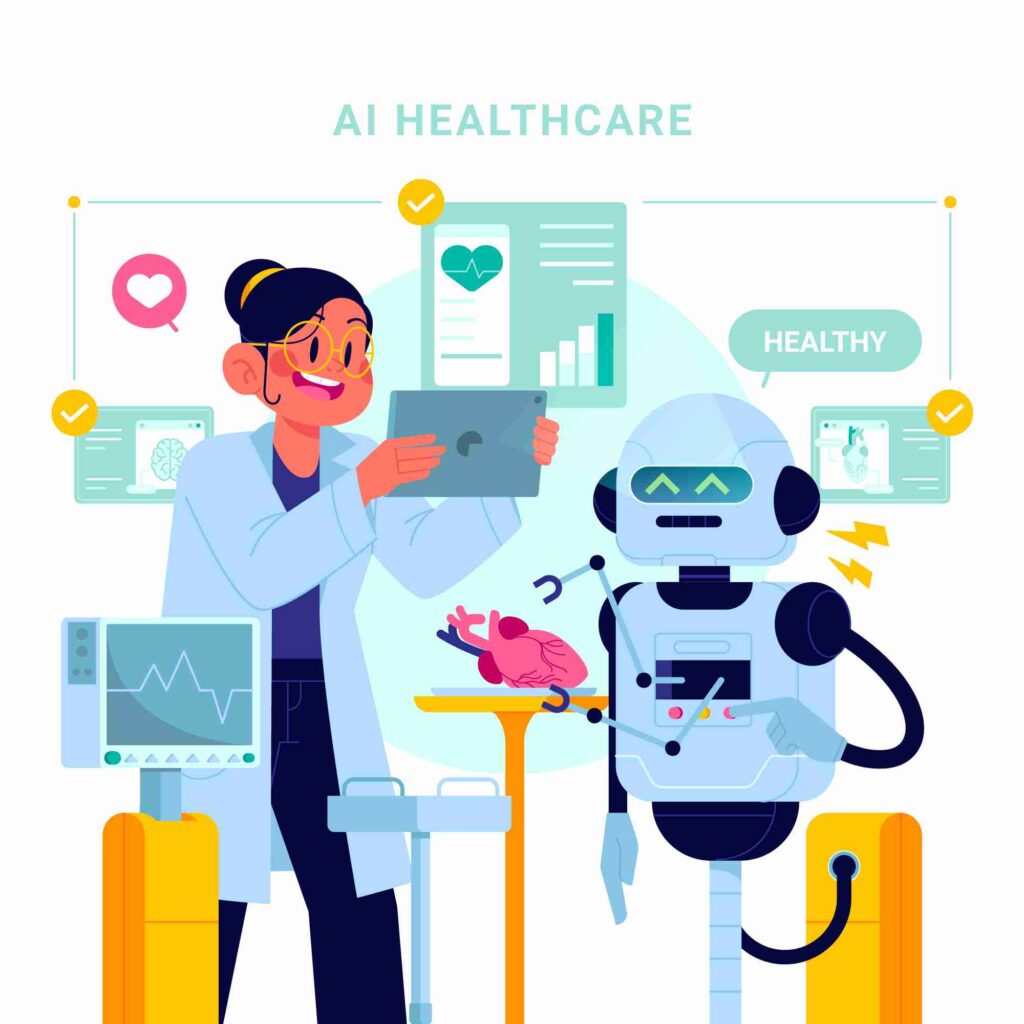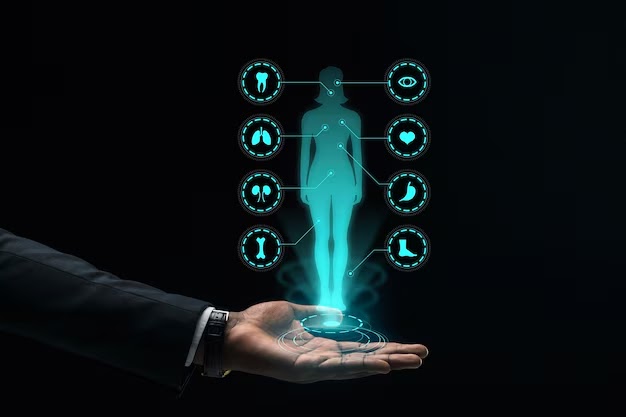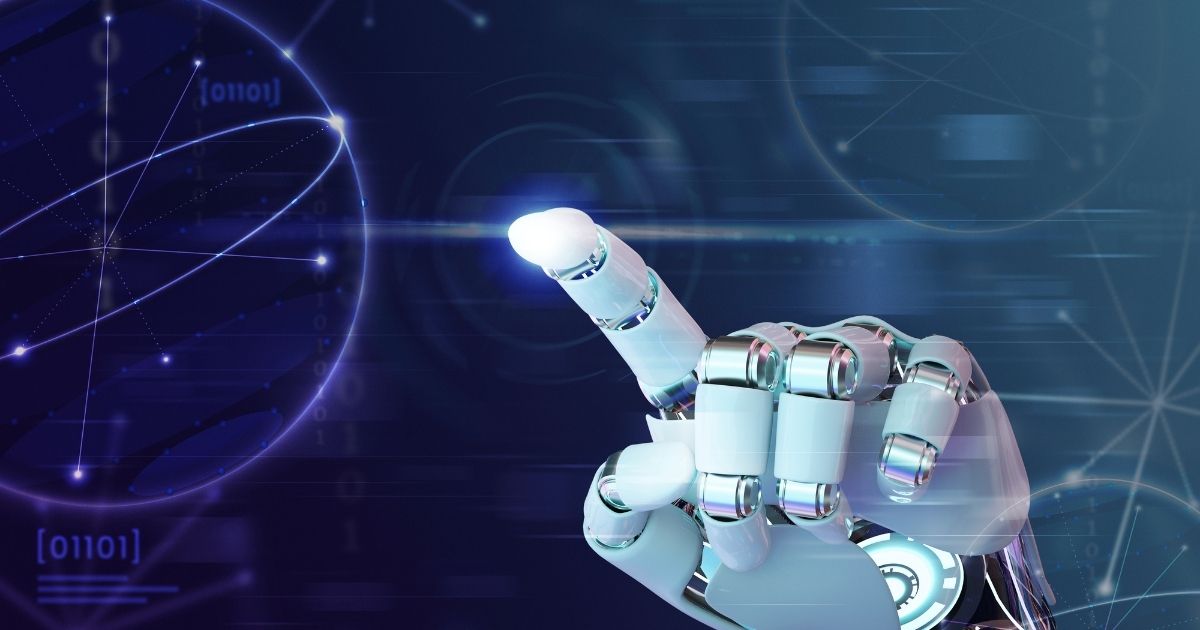Mercilina Norman

The most commonly explored Artificial intelligence (AI) has been a disruptive force in a number of industries in recent years, and the healthcare sector is one where it has the enormous potential to change. The potential of artificial intelligence (AI) to handle large volumes of data, identify patterns, and make highly accurate choices is opening up new avenues for various medical research projects and personalized patient treatment. This new frontier in healthcare quality promises to increase overall operational efficiency, expedite administrative procedures, and improve personalized therapy in addition to improving diagnostic accuracy. AI technologies have the potential to completely change the way healthcare is delivered, improving patient outcomes and streamlining treatment for patients everywhere as they develop.
The AI market for healthcare has shown significant development; estimates place it at $6.6 billion by 2021, rising at a pace of 40%. Large datasets from wearable health monitors and medical records are becoming more widely available, and this rise is being propelled by developments in computer power and learning algorithms 10. AI has the ability to save treatment costs by up to 50% and improve patient outcomes by 30% to 40%, demonstrating the enormous economic impact technology will have on the healthcare sector. Additionally, the market for artificial intelligence in healthcare was estimated to be worth USD 16.3 billion in 2022 and is projected to increase at a compound annual growth rate (CAGR) of 40.2% to reach USD 173.55 billion by 2029.
AI in healthcare has the potential to completely change the Healthcare industry by providing an unprecedented level of diagnostic accuracy, individualized treatment regimens, and effective and efficient patient care management. AI may assist medical practitioners in making better decisions by utilizing large volumes of data, which will eventually improve patient outcomes and save expenses and time.Thus, the healthcare industry and AI are together transforming millions of lives globally.
EVOLUTION OF ARTIFICIAL INTELLIGENCE
Artificial Intelligence (AI) has emerged as a transformational technology that has remolded the landscape of numerous industries, ranging from finance and marketing to entertainment and so healthcare is no exception.When it comes to Healthcare, Artificial intelligence(AI) plays a pivotal role in transforming lives. It is concerned with building machines that can carry out operations that normally calls for human intellect.Artificial intelligence (AI) is not motivated by a survival instinct, in contrast to human intellect. However, our thoughts of artificial intelligence are usually associated with computers that want to outcompete humans and robots that resemble humans.We frequently employ artificial intelligence (AI) without realizing it. Artificial intelligence is pervasive, appearing in everything from Snapchat filters to Siri to Google Maps traffic reports.AI has paved the way to previously unattainable improvements in the overall standards of healthcare.AI has several uses in the healthcare sector which includes illness diagnosis, individualized treatment plans,Predictive Analytics,Drug Discovery and Development,Robotic Surgery and many more.
DIVERSIFIED APPLICATIONS OF AI IN HEALTHCARE
Diagnostics and Imaging in Medicine
Medical imaging is now far more accurate and efficient because of AI. Deep learning algorithms have the ability to evaluate pictures from CT, MRI, and X-ray scans and diagnose anomalies and genetic defects with an accuracy level that is on par with or even higher than human radiologists. AI models like CheXNet and BoneView have been trained to recognize fractures, cancer, and other illnesses, allowing for quick diagnosis and treatment in healthcare facilities. In diagnostics and imaging Artificial Intelligence provides a great platform for precise diagnosis of a wide spectrum of diseases.
Predictive Analytics
Anticipating disease outbreaks, patient admissions, and possible consequences is made easier with the use of AI-powered predictive analytics. Artificial intelligence (AI) can forecast a patient’s specific risks and suggest preventative actions by examining genetic information, lifestyle data, and electronic health records (EHRs). AI systems, for instance, can predict the risk of readmissions, enabling medical professionals to carry out focused treatments to lower hospital readmission rates and provide efficient care to the patient.
Personalized Medicines
Treatment regimens are customized for each patient by personalized medicine taking into account their genetic composition, way of life, and surroundings.
AI is essential to this because it analyzes vast amounts of genomic data to find genetic markers linked to certain diseases and how they respond to various therapies. This makes it possible to create individualized treatment plans that are less harmful and more successful.

Virtual Health Assistants
Virtual health assistants with AI capabilities are revolutionizing patient self-management and engagement. These digital assistants may book appointments, remind patients to take their meds, give medical information, and respond to questions related to health. They improve overall health outcomes and increase patient adherence to treatment approaches.VHAs are intended to provide patients information, assistance, and direction regarding healthcare. These assistants help clients manage their health and wellbeing by interacting with them in a conversational way using artificial intelligence (AI) technology such as machine learning and natural language processing.
Robotic Surgery
Artificial intelligence (AI)-guided robotic-assisted surgeries provide more control, accuracy, and flexibility and a higher level of precision than conventional surgical techniques. AI algorithms help surgeons to minimize invasiveness and shorten recovery periods by helping them plan and carry out complicated surgeries like Prostatectomies, hysterectomies, cardiac valve repair, and complex gastrointestinal procedures. AI is used, for instance, by the da Vinci Surgical System to convert the larger, more fluid hand motions of a surgeon into tiny, more accurate movements of surgical tools within the body of the patient.
IS AI CHANGING LIVES IN HEALTHCARE?
According to recent studies AI tends to bring a drastic change in the healthcare Industry changing numerous lives.Healthcare is changing dramatically as a result of artificial intelligence (AI), which holds the potential to improve patient outcomes, expedite processes, and customize medical care. The use of cutting-edge algorithms and machine learning models that can analyze enormous volumes of data, find patterns, and offer insights that were previously unachievable characterizes this new era of medical innovation.
In the field of diagnosis and detection, artificial intelligence has made one of the biggest contributions to healthcare. Artificial intelligence (AI) systems, especially those built on deep learning, have shown to be very accurate in interpreting medical pictures, including CT, MRI, and X-ray scans. These algorithms are able to recognize minute irregularities that might be a sign of early-stage ailments such as neurological problems, cardiovascular issues, and malignancies. AI algorithms have made it possible to identify lung cancer nodules from CT images more accurately than human radiologists leading to early detection and efficient treatment interventions. AI is essential to personalized treatment in the field of genetics because of its capacity to evaluate massive information.

AI can suggest individualized treatment strategies and anticipate a patient’s vulnerability to specific diseases by looking at their genetic information. Because the medicines are customized based on the genetic composition of the patient, this method not only maximizes the effectiveness of the drugs but also reduces side effects.Chatbots and virtual health assistants driven by AI are transforming patient care by offering round-the-clock assistance. By providing medication reminders, scheduling appointments, and responding to patient inquiries, these technologies help increase treatment plan adherence. By evaluating symptoms and suggesting the best course of action, virtual assistants may also triage patients, relieving the strain on medical staff and guaranteeing prompt treatment.
AI algorithms in the field of public health are able to forecast disease outbreaks by examining trends in a variety of data sources, such as traveler data, social media posts, and weather reports. These insights facilitate the implementation of preventative measures, efficient resource allocation, and the reduction of the burden of infectious illnesses by public health officials. AI has, for instance, been used to forecast influenza epidemics, enabling prompt vaccination drives and public education campaigns.
Healthcare administrative duties, such invoicing and medical paperwork, take a lot of time and are prone to mistakes. These jobs are being automated by AI, allowing medical staff to concentrate on patient care. Algorithms for natural language processing (NLP) may assure proper invoicing, code diagnoses and procedures, and transcribe medical notes—all while minimizing mistakes,human errors and administrative hassles.
Although AI has a lot of promises for the healthcare industry, there are a number of ethical and technological issues with it. Since AI systems handle sensitive patient data, data privacy and security must be guaranteed. Strong security measures need to be put in place to safeguard against hacks and illegal access to sensitive data and maintain confidentiality of patient’s information.
Another crucial issue with AI models is how to handle bias and fairness. In order to prevent biases that can result in unfair treatment, AI systems must be trained on a variety of datasets. In order to preserve confidence and responsibility in AI-driven healthcare, efforts must be made to guarantee the openness and explainability of AI choices.
NAVIGATING THE COMPLEXITIES: CHALLENGES OF AI IN HEALTHCARE
Artificial intelligence (AI) has become a formidable instrument that might completely transform the way healthcare is delivered. It has hitherto unseen possibilities for boosting operational effectiveness, optimizing resource allocation, and improving patient outcomes. But there are obstacles to overcome before AI can be successfully applied in healthcare. Healthcare companies confront several challenges in their quest to smoothly incorporate AI into their operations, ranging from technological difficulties to ethical dilemmas and legal barriers.
Data Accessibility and Quality
High-quality data is the cornerstone of every successful AI application in the healthcare industry. However, using AI is significantly hampered by the fragmented, siloed, and inconsistent quality of healthcare data. To properly train AI algorithms and provide insights that can be put to use, it is imperative to ensure that data is accessible and interoperable across heterogeneous systems. To overcome these obstacles and fully utilize AI, healthcare businesses need to invest in strong data governance frameworks, data standardization initiatives, and interoperability solutions.
Data privacy and compliance with regulations
One of the sectors with the highest levels of regulation is healthcare, which has strict guidelines for patient privacy and data security.Healthcare firms have a great deal of difficulty when implementing AI technologies while maintaining compliance with laws like the Health Insurance Portability and Accountability Act (HIPAA).Strict data privacy regulations must be followed by AI algorithms, and businesses need to put strong security measures in place to guard sensitive patient data from breaches or unwanted access.To develop and execute AI solutions that fulfill regulatory standards without compromising patient privacy or data security, healthcare providers, technology suppliers, and regulatory bodies must work closely together to navigate the complicated regulatory landscape.
Ethical and Societal Repercussions

AI in healthcare brings up important ethical and societal issues that need to be properly thought out and resolved. Healthcare companies must address a variety of ethical issues when implementing AI, from worries about algorithmic bias and fairness to issues with transparency, accountability, and algorithmic accountability. For healthcare organizations looking to maximize the advantages of AI while avoiding possible drawbacks, ensuring openness and accountability in AI-driven decision-making processes, eliminating biases in AI algorithms, and encouraging justice and fairness in healthcare delivery are crucial concerns.
Clinical Adoption and User Acceptance
The effective integration of AI technologies in clinical practice continues to be a substantial problem, despite the potential benefits of AI in healthcare. Healthcare professionals may be reluctant to use AI technology because they fear losing their jobs, losing their autonomy, or realizing that the precision and dependability of AI-driven suggestions would be compromised. To overcome these obstacles, extensive training and education initiatives, continuous involvement and support from clinical stakeholders, and thorough assessments of the clinical value, usability, and effects of AI solutions on patient outcomes are all necessary. Healthcare institutions may encourage a higher level of acceptance and use of AI technology in clinical practice by integrating clinicians in the design, development, and deployment of AI solutions.
Technological Integration and Complexity
Overcoming technical obstacles in algorithm creation, model training, and interaction with current clinical procedures and information systems are necessary for using AI in healthcare. Healthcare institutions have to successfully negotiate the challenges of incorporating artificial intelligence (AI) technologies into their current IT framework, guaranteeing smooth communication between medical equipment, electronic health records (EHRs), and other healthcare systems. Proficiency in data science, machine learning, and domain-specific healthcare knowledge are prerequisites for creating AI algorithms that are dependable, accurate, and therapeutically relevant. For AI technologies to be successfully implemented in healthcare, data scientists, physicians, and IT specialists must work together to overcome technological obstacles.
THE FUTURE CONTEMPLATION OF AI IN HEALTHCARE
The Advanced Genomics and Precision Medicine
It is anticipated that AI will be essential to the advancement of genomics and
exact medication. By doing an unparalleled analysis of genomic data,
scale, AI can provide fresh perspectives on the underlying genetics of illnesses
and pinpoint new therapeutic targets and regimens.This will leads to a possibility for the
development of individualized, highly customized therapies for various genetic disorders and helps in early detection and diagnosis.
AI and Internet of Things (IoT) Integration
Real-time patient monitoring and management will be improved by the integration of AI with IoT devices, such as wearable health monitors and smart medical equipment. IoT devices have the capacity to continually gather health data, which AI algorithms may then use to identify early warning indicators of numerous health problems and launch prompt action.A new era of technological innovation is being powered by the intersection of Artificial Intelligence (AI) and the Internet of Things (IoT), which is transforming industries and revolutionizing daily lives. With the use of AI, IoT devices can process and analyze enormous volumes of data and make deft judgments without the need for human interaction. New opportunities for productivity, automation, and connection are made possible by combining these two.
AI-Powered Therapeutic Discovery
AI’s capacity to forecast the interactions between various chemicals and biological targets holds the promise of completely changing the drug discovery process. This can save expenses and expedite the drug development process considerably.AI-powered models are also capable of identifying current medications that have potential for novel therapeutic uses.
Enhanced Patient Engagement
AI-powered solutions that offer individualized health information, reminders, and assistance will keep improving patient engagement.Chatbots and virtual health assistants will advance in sophistication to provide patients with a smooth and engaging medical experience.Artificial intelligence (AI) also improves clinical decision support systems by giving real-time insights and suggestions based on patient data and the most recent medical research. This enhances patient outcomes by empowering clinicians to make better judgments.
Telemedicine and Remote care
The COVID-19 pandemic has expedited the assimilation of telemedicine, and artificial intelligence will augment the proficiencies of remote treatment. AI can help with virtual consultations, patient monitoring, and remote diagnostics, improving accessibility and convenience in healthcare.
Without a doubt, the future of healthcare quality lies in artificial intelligence. Healthcare delivery is changing as a result of its applications in robotic surgery, virtual health assistants, customized medication, predictive analytics, and medical imaging. AI in healthcare has enormous promise, but there are obstacles to be solved, including data protection, integrating with current systems, and ethical issues. AI technologies will open up new avenues for boosting efficiency, cutting costs, and improving patient care as they continue to develop. To improve patient outcomes and advance medical knowledge, healthcare must embrace artificial intelligence (AI).With its breakthrough potential to improve patient outcomes, increase operational efficiency, and advance medical research, artificial intelligence (AI) offers a new frontier in the excellence of healthcare. By utilizing AI, we are not only redefining what is feasible in the medical field but also laying the foundation for a day when proactive, personalized, and precise treatment will be the hallmarks of medical excellence. Realizing the full promise of AI in healthcare will need ongoing innovation, teamwork, and ethical stewardship as we traverse this fascinating frontier.
Authors Biography
Mercilina Norman is currently pursuing an MBA in healthcare and hospital administration. She also has experience as a staff nurse.

